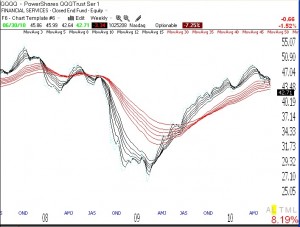My short term indicators are signaling at least a short term decline. Wednesday was the 4th day of the new QQQQ short term down-trend. Once a decline begins one never knows how long it will last. A major clue I use is the Worden T2108 Indicator. Most of the time a decline ends with this indicator below 20%. The 2008 decline ended with a reading around 1.2%. It currently is at 26%.
With the entire world seemingly enamored of cutting government deficits, several pundits are asserting that this misguided strategy will bring on an economic depression. I tend to agree. Government spending = somebody’s income. When you cut spending you reduce income, throw people out of work and cut consumer demand, not exactly the outcomes that we desire. If government spending does not make up for the huge loss in wealth and consumer demand that resulted from the evaporation of real estate values, where is the money going to come from to foster demand for goods and services? So, in this context, the market may be telling us that really bad times are ahead.
It is therefore time for me to get defensive and to begin to pull money out of my university pension mutual funds. I will do so in stages as the trends mature. The weekly GMMA chart below shows that the longer term moving averages (red) of the QQQQ are beginning to level out. We are not in a full fledged decline yet, but once the longer term averages top out and curve down as they did at the end of 2007, we will be. Therefore, with the shorter term averages (black lines) in a decline and converging with the longer term averages (red) I believe we are more likely at the beginning, rather than at the end of a major decline.

Reducing gov’t spending reduces someone’s income?
Respectfully, I disagree.
If gov’t spending goes up $100 by increasing taxes. That $100 was taken from someone that was productive and earned that $100. THAT person then has $100 less to spend, let’s say he does not by the suit that he was going to purchase. The suit maker then loses that income, the suit maker then buys less materials, the materials person loses his income and on it goes.
Reducing gov’t spending is the answer not the problem.
Mike
You are correct. That is why we need to continue deficit spending and not raise taxes until we get a recovery.
Again, I will respectfully disagree.
For the sake of an intellectual discussion another point to consider is the immorality of deciding that this generation somehow deserves to somehow live “better” or “richer” and that it is okay to force the next generation to pay back the deficit spending with interest? The next generation pays the bill while we spend, spend, and spend some more.
That is simply immoral in my humble opinion.
Take good care and thanks again for hosting such a great blog!
Mike in Dearborn MI
The problem with Mr.Krugman’s scenario is the homogenization of the issue. In many states, it is typical to see unionized state and local workers receive compensation, benefit and retirement benefits unknown in the private sector.
In Mr. K’s scenario, the public sector employee would continue to live better and better, while the tax-supporting private sector employee slowly goes under. An absurdly over-compensated public
sector is a core issue in our present situation,one unaddressed by our elected ones; It’s a visible constituency, you see.
In any event, as time progresses, would you please comment on a depression investment scenario. I have heard cash is king
I concur with Mike in thanking you for your efforts and excellent blog.I have been out of the market for several weeks now, safely in cash.
Cordially,
Bill K
Dr. Wish:
When do you go to cash in the IRA?